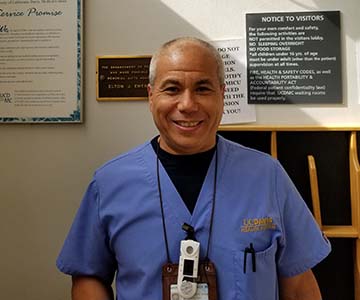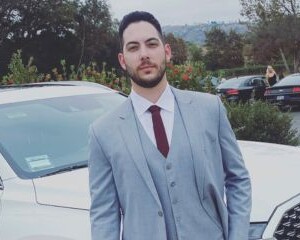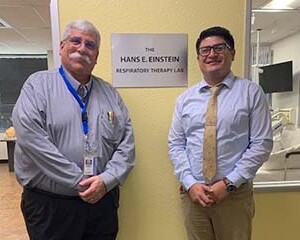Job hopper finds dream career as a respiratory therapist
 Tim Seldow knows what it’s like to live day-to-day without any sense of what the future holds. His roots were planted in shallow ground, easily pulled up and transplanted into another nutrient-thin environment.
Tim Seldow knows what it’s like to live day-to-day without any sense of what the future holds. His roots were planted in shallow ground, easily pulled up and transplanted into another nutrient-thin environment.
It started early when, at eight years old, his single mom left him with his grandparents who had immigrated to the U.S. from the Philippines. They were ill-prepared to care for a child and placed little value on things like education and supervision. “The message they gave me was that school was not important,” says Tim.
Tim was on his own to figure out what to do with his time. “I played hooky all the time, never went to school and got into some trouble,” he says. By the time he was 16, his grades were dismal, and he had earned no high school credits.
At the urging of his uncle, Tim’s grandparents relinquished him to a group home. “They agreed to put me in a Christian boarding home that was pretty much a cult,” says Tim. “I was one of the two youngest of 12 males in this halfway house. We couldn’t watch TV or listen to the radio, and weren’t allowed to leave the house without being escorted.”
After a few months, Tim sneaked to a phone booth, called his mom and pleaded for her to come and get him. She told him she had met a man whom she might marry and asked Tim to give her some time. He didn’t have to wait long.
“He just marched in there and pulled me out,” says Tim. “I was so confused because they (church) would pray this wouldn’t happen; they thought I would lose my soul out in the world.”
Tim’s new stepdad Richard was determined to get him back on track. He started high school again, but still couldn’t get better than D grades in his classes. “Everybody was so much smarter than I was,” he remembers. He transferred to Adult Continuation Education before trying high school again his Junior year.
At first, Tim was pulling the same low grades he had always earned, but slowly he turned it around. “I was always overloaded with books in my college prep courses,” he says. “Then I started getting As and Bs all the time and finally graduated with a 3.3 GPA.”
Tim and Richard had a complicated relationship. Although Tim credits Richard with setting him in the right direction, he didn’t always appreciate Richard’s methodology. “He taught me how to bust my ass to work hard in school. His idea was negative reinforcement, not positive. But he worked very hard in his life.”
With his stepdad’s financial support, Tim earned his Bachelor’s degree in Economics and later that year his Real Estate Broker’s License. But real estate positions were commissioned-based and slow to build. At 24 years old, he didn’t have the time to invest. “I needed a check from the get-go.”
Tim struck out on his own. He rented a room and went to work as a teller for a bank in the Monterrey area, where he lived for the next couple of years. During this time, he also worked for an answering service, as a valet parking attendant and as a waiter.
He made the jump to Sacramento to take advantage of greater job opportunities. He continued work as a waiter before finding a position with a mortgage lender, which allowed him to use his education and knowledge of real estate, as well as his broker’s license.
An interest in the medical field led him to night school to explore an interest in becoming a pharmacist, but that didn’t stick.
Tim decided to get into the real estate market and, by the time he was 32 years old, he was able to buy his first house. “I started buying homes as an investment at the bottom of the market,” he says. “I got in at a good time.”
He bought three more homes and rode the housing boom to great success. “I realized that the recession was deepening, and values were falling,” says Tim. He sold two of his houses when the market was still high. He didn’t realize at that time that he would be living off those profits for the next few years.
“Suddenly, there were no sales and before I could sell another home, it dropped like a rock,” he remembers. His job was gone, along with his income stream. To stay financially solvent, Tim rented one house, as well as the spare bedrooms in his own home.
At almost 40 years old, Tim was looking at another start-over. He reviewed his options. “I had to choose something, and I didn’t want to be a truck driver,” he says.
It was at this moment of career crisis that Tim received a postcard from San Joaquin Valley College introducing the new Respiratory Therapy program at the Rancho Cordova campus. Could he be a student again? “I would have to apply myself. It would entail reading, studying, taking tests, but I had a background of that. And this time, it would be my idea and I could take credit for it.”
Financing his education could be challenging. “I borrowed against my properties and used that money to fund my education and day-to-day living.” It could work. He started to believe in a possible future he could create.
Tim scheduled an appointment, toured the campus and immediately felt a connection to this medical care specialty. “This was like a miracle happening to me,” he says. “I just seized the moment.” He enrolled for the next Respiratory Therapy start date and made the leap of faith that told him this was the right move.
“I had everything on the line and couldn’t afford to miss here,” he remembers. “We’re all dreamers looking to do things better.”
“I was one of the older students when I started,” he says. “I had an advantage in terms of discipline, life experience and independence. And I valued education and knew I couldn’t waste any more time. That’s why I got all As.”
He weighed his disadvantages. “On the other hand, I didn’t have anyone to help support me and I really didn’t have any savings. But when I had all that money, I didn’t have any direction for it.” He was ready to focus everything on this future. But was this the industry for him?
“I’d never really had any hospital experience, and we were immediately in a clinical setting,” he says of his program training. “Seeing patients was a lot. And, if you’ve never been exposed to people who are sick and dying, you figure out in a hurry whether or not you’re cut out for working in critical health care.”
Tim made the cut. Then, he began to make plans for life after graduation.
Tim had registered with a company that placed respiratory therapists in hospitals that needed extra help on a temporary basis. He had been with them about a month when UC Davis (where he had done his program externship) called him to apply for a position on staff. He went through an extensive panel interview process and was offered the job.
Tim is now living the life he attempted so many times before. There is no fixed routine to his day, as he treats a wide range of patients and conditions. “I work with neonates, pediatrics, adults and geriatrics,” he says. “I might assist in intubations (inserting artificial airway), perform pulmonary hygiene, help people to clear secretions, patient transport within hospital, assist in a bronchoscopy (surgical procedure) or provide patient ventilator management instruction.” He enjoys seeing patients get immediate relief from treatments he provides.
“If you do your job properly, someone comes in in bad shape and you send them home in better shape,” he says.
Sometimes it is far more consequential. “You’re the first one to show up, the first line of defense when someone stops breathing,” says Tim. “Many times, I’ve watched someone slip away and am part of the team that brings them back.”
At 53, Tim is in the full stream of his profession. “I never expected work to be this fulfilling. It’s amazing I’ve gone through the program (Respiratory Therapy). It seems like yesterday that I started work and now I’m not too far away from retirement. It was truly the opportunity of a lifetime.”
You might also like
More stories about
Request Information
All fields using an asterik (*) are required.


